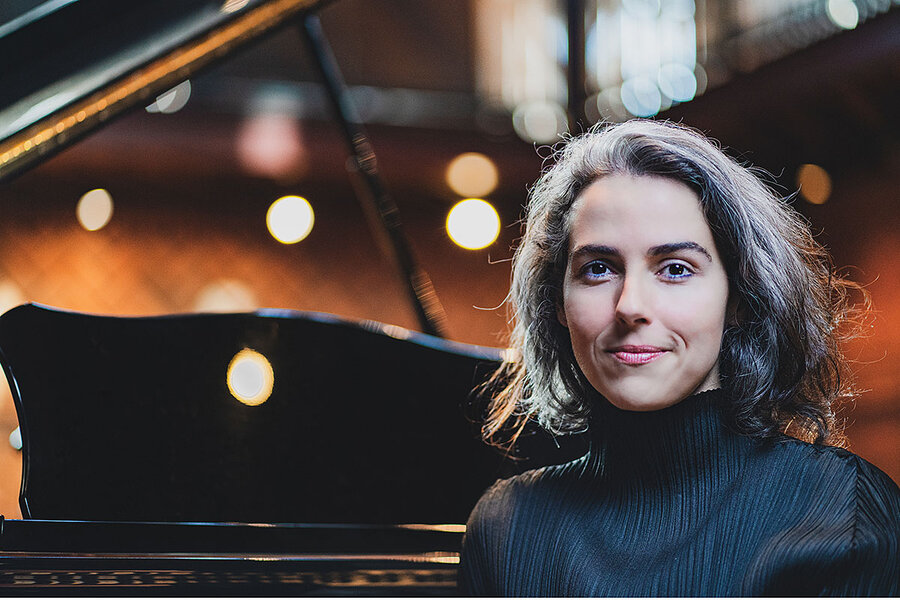‘Our voice matters’: Promoting female composers in classical music
Loading...
Clarice Assad has learned to look to the back of the room for the shy girls, the ones who are afraid to step up to the microphone and lead with their voices. The Brazilian American composer and performer – whose ability to fuse jazz and classical music leaves symphony audiences wanting more – understands what that’s like. She was shy once, too.
“You have to find the balance as a mentor, you know. Everybody has their own way to shine,” she says in a phone interview with the Monitor. “Some of them are very interested, but they can’t really get up to the mic, unless you nudge them ... in a very kind and loving way.”
Her innovative style and ability to draw music out of anyone are part of what makes Ms. Assad a repeat contributor at the Albany Symphony in New York, and why she was commissioned to help a group of girls compose a pop piece based on Sojourner Truth’s speech “Ain’t I a Woman” for its American Music Festival “Sing Out! New York” last year. The multiday event in June 2019 celebrated not only the 100th anniversary of the 19th Amendment, but also the 50th anniversary of the Stonewall uprising that launched the gay rights movement.
Why We Wrote This
What role do female composers play in American music? Clarice Assad works in a largely white, male field, fusing her U.S. and Brazilian influences to inspire symphony audiences and young performers alike.
Ms. Assad “is one of my absolute favorite creative people on the planet,” says David Alan Miller, the music director and conductor of the Albany Symphony. “She’s so magical, her thinking, her music-making, the way she expresses herself. ... I don’t really know of any other composer working in America who can cross genres, or can blend genres between Brazilian jazz, for example, and the grand orchestral tradition the way she can.”
Born in Rio de Janeiro, the Grammy-nominated composer has lived in Brazil, France, and the United States, where she received bachelor’s and master’s degrees in music. Musical ability runs in the family. Her father, Sérgio Assad, forms part of an international classical guitar duo with her uncle, Odair Assad. Her aunt is singer-songwriter and guitarist Badi Assad. All are innovative composers combining classical and jazz traditions fused with Brazilian rhythms and Middle Eastern sounds. They frequently collaborate and perform together to notable acclaim.
The Albany Symphony, with its focus on living composers, regularly commissions new works from Ms. Assad, and she’s a popular performer at the annual American Music Festival. The orchestra industry remains largely risk averse, says Mr. Miller, and that means being reluctant to embrace new and unusual voices, such as that of Ms. Assad, who has more than 70 works to her name.
A recent study by the Institute for Composer Diversity reported that of the 4,066 works scheduled to be performed by 120 American orchestras in the 2019-20 season, only 8% are by women. And that number is a jump from the 2014-15 season, when female composers made up 1.8% of total works performed. That doesn’t mean orchestral works by female composers aren’t available; the Institute for Composer Diversity cites 7,410 in its database.
Programming an orchestral season is a complicated formula of personal preferences of artistic directors, conductors, solo artists, funders, and audiences. Orchestras tend to choose works by mainly deceased, white European men. And because scores are expensive to reproduce, orchestras are more likely to draw from their established libraries.
But there are signs of progress. The League of American Orchestras has been sponsoring emerging female composers since 2014. For the 2019-20 season, many orchestras planned special programs featuring compositions by women to celebrate the 100th anniversary of the 19th Amendment – although many were canceled because of COVID-19.
An eye for innovation
For her part, Ms. Assad seeks to help others embrace new ways of thinking about music. Her award-winning Voxploration programs, which focus on songwriting and improvisation workshops, have attracted participants across the U.S., Brazil, Europe, and the Middle East.
When asked to help commemorate the legacies of famous New York residents Susan B. Anthony, Frederick Douglass, and Sojourner Truth for “Sing Out! New York,” Ms. Assad was drawn to Truth’s speech “Ain’t I a Woman.” Delivered in 1851 at the Woman’s Rights Convention in Akron, Ohio, it is largely recognized as one of the most famous abolitionist and women’s rights speeches in U.S. history. (Although, according to the National Park Service, there is debate around whether the phrase “ain’t I a woman” was added later by someone else.)
In partnership with the Albany chapter of Girls Inc., a national mentoring organization that works to develop leadership qualities in girls ages 6 to 18, Ms. Assad held a workshop with about 10 girls to first study “Ain’t I a Woman” and then draw from their own lives to create lyrics and a melody. Some of the girls had musical experience, but composing was new to all of them.
The song created by the group, and performed by a local girls’ chorus, was the centerpiece of a work that included an actress delivering Truth’s speech with accompaniment by the orchestra. It concluded with Ms. Assad leading an audience call and response, weaving echoes of the past with voices of the present.
“I thought about it ... like a mosaic because there were so many little pieces to put together and they were all pretty and powerful in their own way,” says Ms. Assad. “But they didn’t necessarily go together, so I had to find a way to glue them all.”
“A safe and positive environment”
Rishita Nagothi, a rising senior at Tech Valley High School, said she found a new confidence about her singing from the workshop and performance.
“The workshop was really fun, and I loved it,” says Rishita in an email. “I really don’t see myself as a singer or good at music, but Clarice was really encouraging and created a safe and positive environment, which made me feel comfortable.”
Learning about Truth was eye-opening to Suchi Mehta, a rising senior at Niskayuna High School not far from Albany.
“[The workshop] kind of changed how I look at things, because when we learn about the women’s rights movement we look at women like Susan B. Anthony and white women and their role in it. [And when we learn about abolition] we look at Frederick Douglass, a black man’s perspective on it,” says Suchi in a video call. The intersection of those, she notes, is African American women. “And we don’t really get to see their perspectives as much in schools,” she says. “So now I look for those other perspectives more.”
Working with girls over the past decade – and the orchestra world’s season focused on women – gives Ms. Assad hope. “That whole year [2019-20] was about women composers. But, you know, we don’t want one year to be the vote for us and then nothing. We want that to keep going,” she says. “So we’ll just have to keep on thinking, ‘We are here to stay and our voice matters as much as any other voices.’”







